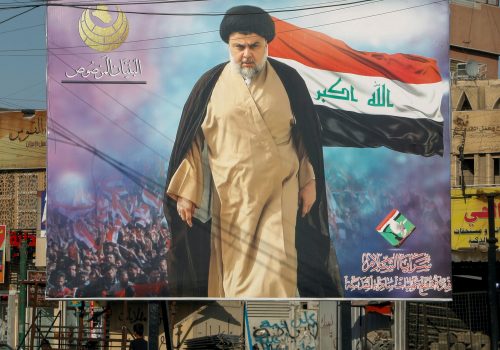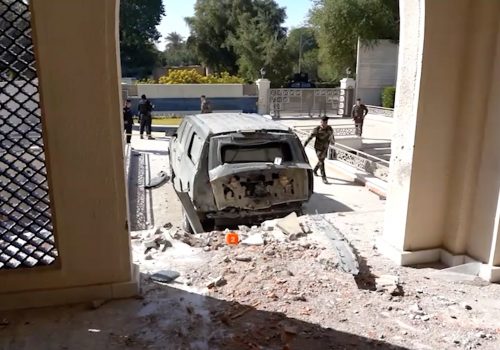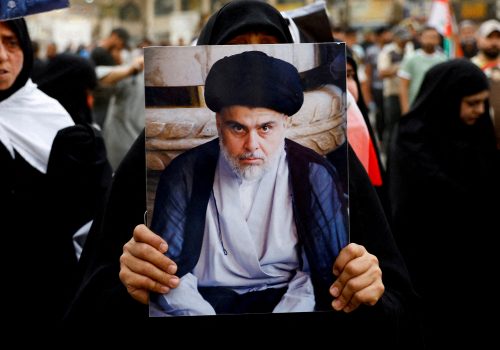Iraq has a new government. The United States would benefit from broad engagement with all Iraqi stakeholders.
From the US perspective, the October 13 selection of Abdul Latif Rashid as president and Mohammed al-Sudani as prime minister may not bode well for the formation of an inclusive government or the strengthening of US-Iraq ties. The fact that the Shia Coordination Framework, which includes parties with strong affiliations to Iran, was able to exploit the government formation process to overturn the results of a popular election held in 2021 will undermine the Iraqi public’s already fragile faith in the political system. Moreover, the framework’s close affiliation with Iran-backed militias suggests a return to 2018-2019, when militias intensified malign activities, such as asset stripping, violent suppression of protests, extortion, and attacks on US forces. These conditions culminated in widespread protests in October 2019, where these same Iran-backed militias, as well as government forces, used violence to bring them under control.
It also does not help that Muqtada al-Sadr, who played an instrumental role in providing an alternative to the Iran-backed parties, has rejected participation in the new government. His ability to agitate and mobilize protests suggests that Iraq is headed for more instability and violence unless the new government finds a way to accommodate the Sadrist agenda. Even worse, the United States does not appear well-positioned to do much about it. Neither Iraq’s Iran-backed political parties, their militias, nor the Sadrists have much interest in anything but superficial ties with the United States. Given that they will be the dominant voices in Iraq for the foreseeable future, the United States could find itself with little room to engage.
So, on the surface, it would seem that US options are limited. However, by adopting an opportunistic approach that engages a range of Iraq’s stakeholders, the United States can create space for more constructive engagement. This approach avoids simply imposing costs—such as sanctions or limiting security cooperation and arms sales—and, instead, emphasizes creating more attractive alternatives that are better in line with US and Iraqi interests.
Of course, the United States may conclude that Iran’s apparent dominance, coupled with the Iraqi government’s inability to make meaningful reforms, suggests that there is little to be gained by increased engagement. However, despite the current government’s setback to Iraqi democracy, all hope may not yet be lost. Sudani resigned from the Dawa party in 2020 after protests were underway to reportedly advance his political career because he believed voters were more interested in independent candidates. This suggests that he may be open to incorporating more of a nationalist reform agenda in future policy.
Moreover, despite dominance by Iran-backed parties, the framework also includes more moderate factions, such as Ammar al-Hakim’s National Wisdom Movement and former prime minister Haider al-Abadi’s Victory Alliance, who are united primarily, if not only, by their opposition to Sadr, and little else. Even if these more moderate elements do not get adequate representation in the new government, it is also likely that Kurdish parties will hold key cabinet positions, with the Foreign Ministry reportedly going to the Kurdistan Democratic Party (KDP) and the Justice Ministry to the Patriotic Union of Kurdistan (PUK). These last points suggest that the United States could benefit by engaging a wide range of Iraq’s subgroups to not just find, but create a way ahead.
One other reason for hope is, presumably, no one wants a return to the conditions that sparked protests in October 2019. That means Sudani will have to pay attention to the appearance, if not the fact, of Iranian influence as well as signal openness to reform. Such measures should include curbing militia violence against protestors, attacks against US interests, and committing to early elections. Doing so should increase the value of cooperation for all sides. Given justified cynicism regarding its government, turning that increased value into an actual incentive to cooperate, however, will depend on how substantive those measures really are. Here again, is space where US engagement could prove profitable.
Shaping alternatives depends first on understanding the choices actors perceive they have. Iraq’s internal stakeholders are the government, Iran-backed militias and political parties, and the public. This breakdown is, of course, an oversimplification; however, it represents the broad tensions inherent in Iraq’s current political situation. It also represents the major actors who have the ability to influence the choices of other actors significantly. So, it should be useful to illustrate the approach under consideration here.
Given the context of US-Iraq relations, one way to express the Iraqi government’s interest is to increase its benefit from cooperation with the United States without triggering a backlash from militias and other Iranian proxies. From the perspective of the militias, one way to express their interest is to maximize access to government funding and other resources, oppose any US presence, and engage in criminal activity without triggering a costly response from the government, the public, or even the United States that returns them to the conditions of October 2019. While the Iraqi public represents its own diverse set of actors, one can broadly express their interest in adequate public services, good government, and employment opportunities without subjecting themselves to authoritarian or sectarian rule and malign external influences.
Shaping the choices of these actors depends on a couple of things. First, is having credible and capable measures that other actors believe is in their interest to implement and will leave them better or worse off if they fail to cooperate, depending on what choice one tries to incentivize. Second, one can use these measures to change the stakes relative to a particular interest. When in competition, for example, the higher the stakes, the less likely other actors will cooperate. In fact, lowering the stakes is one way to understand efforts to reform the Muhasasa system, whose sectarian nature accounts for much of Iraq’s political impasse. By creating a new system where parties can afford to lose an election, one creates more space where the will of the Iraqi people—not their demographic make-up—can have greater expression.
Finally, if one can change the status quo relative to other actors, one can raise or lower others’ thresholds for acting, even if they do not prefer that status quo to an ideal alternative. For example, measures that improve the economic status quoby improving diversity and opportunity can make alternatives, like militias, less attractive. Since militias would arguably benefit from such improvements, their threshold to oppose them, especially if they can happen on a broad scale, may be high enough to disincentivize any challenge.
Taken together, these factors allow one to better calibrate offers, requests, and demands to improve the likelihood of cooperation. Credible and capable measures frame what one can do; changing the stakes can change what other actors should do; and changing the value of the status quo can impact actors’ decisions about what they will do. For example, the United States and Iraqi governments appear to have disincentivized another lethal escalation between Iran-backed militias. This has been achieved by lowering the stakes of the US presence via formally transforming the mission to a largely advisory one.
Given that this transformation did not significantly change the US ability to assist Iraqi forces, it effectively lowered the stakes associated with the US presence while raising the militias’ value of the status quo, since that transformation did not fundamentally change its capability to assist Iraqi forces.
So, as far as a way ahead, the United States would benefit from broad engagement across a range of Iraqi stakeholders—including those adversarial to the United States—to identify interests and opportunities to facilitate cooperation. Such an approach will typically yield modest results, but these results can accumulate and place the United States in a better position than the alternative of limiting its engagement.
Dr. Tony Pfaff is a nonresident senior fellow with the Atlantic Council’s Iraq Initiative and the research professor for Strategy, the Military Profession, and Ethic at the Strategic Studies Institute (SSI), US Army War College in Carlisle, PA. The Opinions expressed here are his own and do not necessarily represent those of the U.S. government.
Further reading
Wed, Jun 22, 2022
The immutable Muqtada al-Sadr loses a battle against Iran
MENASource By Andrew L. Peek
The June 12 decision by Iraqi Shia cleric Muqtada al-Sadr to renounce his electoral victory and collapse the government formation process is a gift to Iran.
Mon, Nov 8, 2021
Experts React: Assassination attempt on Iraq’s prime minister
MENASource By Andrew L. Peek, Barbara Slavin, C. Anthony Pfaff, Thomas S. Warrick, Matthew Zais, Nathan Sales
Atlantic Council experts react to the news of the attack, assess the impact on Iraqi politics, and offer their analysis on how the international community may respond.
Tue, Jun 14, 2022
Muqtada al-Sadr just issued a mass resignation decree. Where does Iraq go from here?
MENASource By Abbas Kadhim
An early election won’t solve the Iraqi dilemma.
Image: Newly elected Iraqi President Abdul Latif Rashid has named Mohammed Shia al-Sudani as prime minister-designate and tasked him with forming a new government in Baghdad, Iraq, October 13, 2022.?Iraqi?Parliament?Media Office/Handout?via REUTERS


